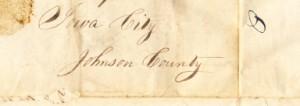Posted by Candice on Monday, Oct 13, 2014
 A couple weeks back the Info Desk received a letter in the mail from someone who had recently purchased a postcard mailed from Iowa City. The card had been sent in 1875, and had a unique stamp that was the postage cancellation mark. This person wanted to know if we were able to determine anything about that mark and what it might mean.
A couple weeks back the Info Desk received a letter in the mail from someone who had recently purchased a postcard mailed from Iowa City. The card had been sent in 1875, and had a unique stamp that was the postage cancellation mark. This person wanted to know if we were able to determine anything about that mark and what it might mean.
Where to begin, right? I'm not very familiar with the collecting and/or research of letters and stamps, and we had little to go on. The cancel mark itself looked like the letters 'JIC' and didn't appear to be handwritten. I didn't even know what to call the mark, so I started by looking at some general resources about the postal system. I found that, before the advent of machine-generated stamping and marking, postmasters would cancel postage in various ways, including uniquely-carved stamps that were often made of cork. The marks that these stamps made are often called 'fancy cancels.' I then started looking for other postcards that had been recorded or auctioned that were sent from Iowa City, as well as looking though numerous different fancy cancels from Iowa. I eventually did find one other postcard that had been sent from the area that had a very similar cancel, but was unable to find any specific information about it. However, that was enough to make me think that we were indeed dealing with a stamp that was regularly used by one of our postmasters.
Without ever being able to positively identify what the initials stood for, a good guess would be 'Johnson Iowa City.' Other fancy cancels served a similar purpose of identifying place of origin. I also wondered that it might be the initials of a postmaster...but how would I find that out? I started browsing some of the resources contained in the database Ancestry, and lo and behold, it contains the aptly titled Appointments of U.S. Postmasters, 1832-1971. I was easily able to view all of the postmasters from Iowa City who had appointments during the time this postcard was sent, and...nothing. No names matched those initials. What I did find, though, was that several of the area's well-known people were appointed as postmasters, including Samuel Trowbridge, Chauncey Swan, and Edward Lucas, son of Robert Lucas. There were other notable names too, such as landowners Jacob Ricard and George Clark, and store owner John Whetstone. Finding these names in this database tells a little more of the story of Iowa City, of the people who lived here and helped build it.
In the end, I was not able to provide a definitive answer for our patron, but I did enjoy trying. If you have any information or ideas related to old postage marks from Iowa City, please leave a comment.
Want to try out Ancestry Library Edition? Stop by the Info Desk for help!
Want to see some old letters mailed to Iowa City? Check out our Digital History Project!
Want to read an oddly fascinating book about postal systems? Check out The Crying of Lot 49!


Oh wow, when I first saw this title, every remnant of my teenaged self reached for the Aqua Net and whatever dayglo clothing I could find! The mall was such a feature of my adolescent years, the word was synonymous with both fashion and social life. Now that I'm older and the wants and ways of people and buying have changed, the mall takes on a bittersweet/wasted space element. Lange's book, however, not only looks back at what the mall was, but also forward, finding ways to repurpose and make equitable the space and resources they provide. Is there hope for the mall yet?? Find out! -Candice